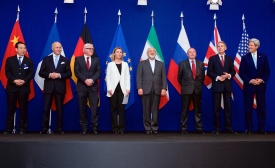nuclear agreement

Hardliners on both sides have ramped up their efforts to sabotage the deal, while both governments are trying very hard to defend the deal and present it as a historical victory, which it truly is. The publicity that the Iran Deal debates has gotten has allowed both the Iranian and American governments to portray their countries as pragmatic, pro-diplomacy, and pro-peace—thereby enhancing their soft power, as opposed to repellently boasting about their hard power.
Despite decades of U.S. sanctions against Iran, change came when the U.S. worked with Britain, France, Germany, Russia, China and the EU to forge the diplomatic agreement. The glue holding those relations together is U.S. credibility.
Secretary of State John Kerry said Friday that the nuclear accord he negotiated with Iran was in Israel’s interest and that the Israeli government’s decision to oppose it could further its isolation. “I fear that what could happen is if Congress were to overturn it, our friends in Israel could actually wind up being more isolated and more blamed,” Mr. Kerry said in an appearance at the Council on Foreign Relations.







